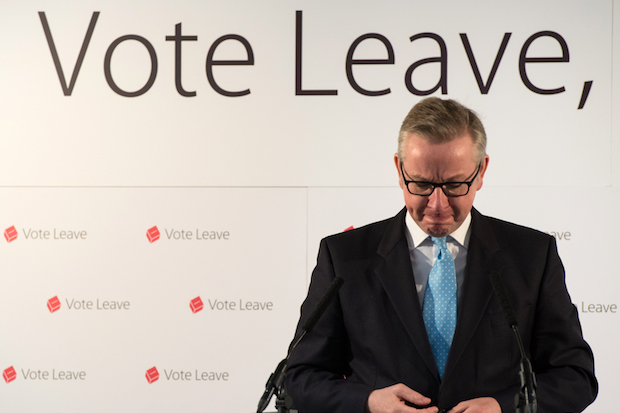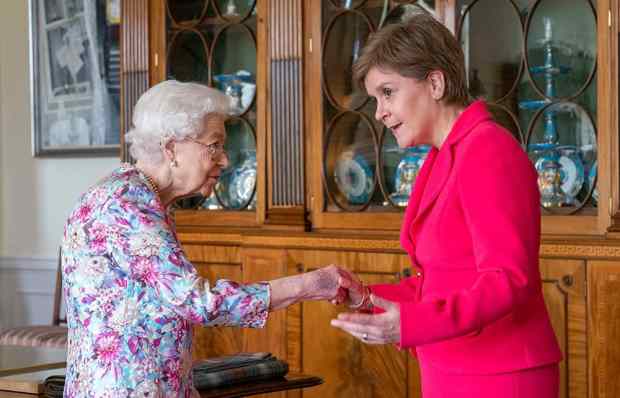So far the campaign for the EU referendum has resembled a contest as to which side can spin the most lurid and least plausible horror stories. On the one hand, the ‘in’ campaign claims that we’ll be £4,300 worse off if we leave; that budget airlines will stop serving Britain and that we will become more prone to terror attacks. Not to be outdone, the ‘out’ side warns that we will be crushed by a fresh avalanche of regulation and immigration, and more prone to terror attacks.
The tone of the debate was summed up by Michael Gove this week when he accused the ‘in’ campaign of treating the public like children by spinning stories of bogeymen — only then to claim that voting to remain in the EU would leave us like ‘hostages locked in the back of the car’. The Justice Secretary, like his opponents, should know that such exaggerations weaken his overall case. Britain has been creating more jobs than the rest of Europe put together, which suggests it isn’t exactly a ‘hostage’.
As Martin Vander Weyer points out on page 30, the truth suits neither side: the truth is we just don’t know. A Treasury that cannot forecast six months in advance asks to be taken seriously about what it thinks will happen 15 years’ hence. The ‘leave’ campaign ought to admit that the whole European project might collapse even if we stay, and there will be a fresh chance to improve the terms of our membership when the French and Germans next ask for change to the EU treaty. Britain has, over the years, done well at dodging the worst of the nonsense from Brussels. Yet this fact is ignored by a ‘remain’ side which denies the nonsense, and the ‘leave’ side that denies the dodging.
The decision to stay or to leave in itself will make little difference to Britain’s prosperity, nor its ability to fight terrorism. Migration will carry on apace in either scenario, especially with a Living Wage of £9 an hour acting as a magnet to the workers of the world. Brushing over these basic points will ultimately do neither side any good. Nor will unfounded scare stories withstand another two months of scrutiny. The side which will ultimately prevail is the one that retains the most credibility, and which can excite us about what might be done with either our continued membership or our newfound freedom.
While both sides deserve criticism for their tactics so far, the report published this week by the Treasury deserves special condemnation — not least because it was published using public money. The analysis, to which George Osborne has put his signature, is perhaps the most dishonest document ever produced by HM Treasury. Deception after deception was deployed to manufacture a £4,300 figure: GDP was dressed up as household income, a rise was dressed up as a fall. Using honest methods it would be closer to £1,480 — which is startling enough. But the Chancellor, like Gordon Brown, dislikes using an honest figure if he thinks he can get away with a bigger dishonest one.
The whole exercise is undermined by the Chancellor’s admission in 2010 that the Treasury really wasn’t much good at economic forecasting. The failure of Gordon Brown’s Treasury to foresee the last recession was one of the reasons Osborne set up the Office for Budget Responsibility (OBR) to take over the job of producing economic forecasts. He said the OBR would be able to do the job better because it was ‘immune to the temptations of the political cycle’ — temptations which he now seems incapable of resisting. It is as if the Chancellor is trying to remind us why he can’t be trusted with forecasts.
If the ‘remain’ and ‘leave’ camps want to project a more positive message they should make a case showing how we could more successfully emulate the likes of Canada and the US — either through continued EU membership or through a new life outside. It is easy to get wrapped up in issues of migration, daft rules and regulations, arrest warrants and so on, but unquestionably the biggest issue facing the world at present is that of low economic growth and the stalling of global trade. And the extent to which Britain, if it stays in the EU, can persuade the continent to be less protectionist and more globally minded.
And the ‘out’ side would do better to try and paint a picture of how Britain would fare outside the EU. The ‘leave’ campaign’s inability to articulate a clear alternative is baffling when a new set of rules is clearly defined by the World Trade Organisation. Yes, this would subject our exports to a tariff averaging about 4 per cent. Irksome, but perhaps more than offset by a fall in the pound. Yes, we would probably negotiate a better deal. But for the (many) voters curious about ‘what out looks like’, isn’t it right to explore the worst-case scenario?
There are still eight weeks until the referendum: it is, perhaps, not too late to hope that the two campaigns will start treating voters as adults; that they will drop the scare stories and discuss how economic growth can best be promoted. We will have a better debate, and consequently end up with a better answer on 23 June.
Got something to add? Join the discussion and comment below.
Get 10 issues for just $10
Subscribe to The Spectator Australia today for the next 10 magazine issues, plus full online access, for just $10.
You might disagree with half of it, but you’ll enjoy reading all of it. Try your first month for free, then just $2 a week for the remainder of your first year.














Comments
Don't miss out
Join the conversation with other Spectator Australia readers. Subscribe to leave a comment.
SUBSCRIBEAlready a subscriber? Log in